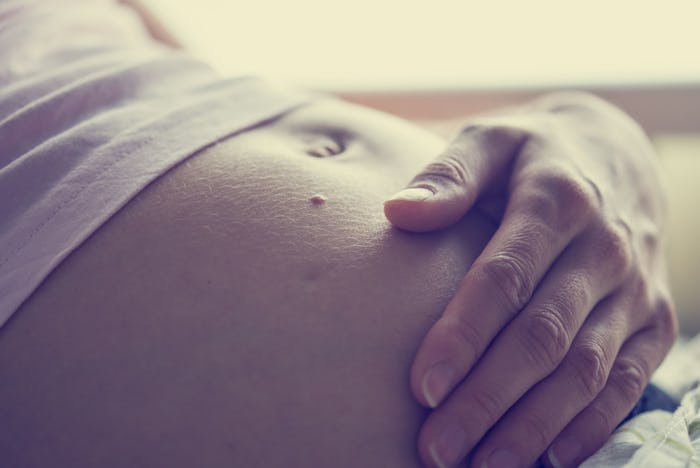Life

Here's Why Your Veins May Look Like A Road Map During Pregnancy
After becoming pregnant, in addition to the fuller bust and thicker waistline, I noticed my body looked like a roadmap to nowhere. I have veins popping up on my rib cage, my legs, and even my breasts. And I may be pale, but I’m not that pale. My veins are more visible than I’ve ever seen them, literally. But why are veins more noticeable during pregnancy? Does it happen to everyone? And do they go away after you’re all done being pregnant?
I asked Dr. Idries Abdur-Rahman, an OB-GYN and medical travel blogger along with his twin brother Jamil for TwinDoctorsTV, why my body was suddenly covered with bright blue lines. He says in an email interview with Romper that hormones and blood volume are to blame for this phenomenon, noting that your pregnancy hormones cause the veins to dilate, which “makes them larger and more visible.” And your “blood volume increases by 50 to 80 percent during pregnancy. So you have larger, dilated veins (thanks to hormones) with more blood in them. The net result is larger, darker veins,” he explains.
When asked where we can expect to see these newly visible veins, Abdur-Rahman replies, “I think the better question here is where won’t you see more prominent veins? Anywhere that you have veins (and that would literally be everywhere), you will have enlarged, darker veins." Your legs, breasts, and abdomen are the most common places you’ll see these veins pop up, he notes, “But it doesn’t end there. Most pregnant women will also notice prominent veins in the genital region and anus. While you won't see the enlarged anal veins, you will most certainly feel them (hemorrhoids).” Ah, hemorrhoids. Who could forget about those?
Abdur-Rahman says the veins will disappear from sight — “or at least significantly lighten” — between six and 12 weeks after you deliver. However, if you have darker skin, they’ll definitely “notice resolution faster than fair-skinned women." And if you don’t see veins during your pregnancy, consider yourself lucky, and don’t worry that you aren’t like other pregnant women. “All pregnant women have pregnancy veins, sometimes you can see them, sometimes you can't — either way, they are there. The primary determinant of your baby's well being is your overall health status and the proper functioning of the placenta, which takes oxygen to your baby and carries carbon dioxide and wastes away from your baby. Neither of these are in any way related to the visibility of your veins,” Abdur-Rahman says.
So when should you worry about your pregnancy veins and see a healthcare professional? Abdur-Rahman says pregnancy veins are “strictly cosmetic and nothing more.” However, there is one exception — deep vein thrombosis (DVT), which doesn’t have anything to do with the visibility of your veins, but what is going on inside of them. “DVTs are blood clots that form in veins and can potentially travel to the lungs, which can be deadly. While DVTs are rare, pregnant women have a higher likelihood of forming DVTs. And when they do, they are primarily located in the calves,” Abdur-Rahman explains. The warning signs for DVT include pain in the affected leg, extreme swelling that doesn’t match the other leg, and redness or warmth in the affected leg. “While lower extremity swelling is the rule and not the exception during pregnancy, women experiencing these symptoms should notify their provider ASAP,” he warns.
While a bit of a shock, noticeable veins during pregnancy are just cosmetic, and occur because of your hormones and increased blood flow. However, if you notice pain, redness, and swelling in just one of your legs, contact your healthcare provider as soon as possible. DVT isn’t something to mess with. And don’t worry, that new road map on your body will disappear after you have your baby — and I bet once you have him or her in your arms, you won’t care about the veins.
Check out Romper's new video series, Bearing The Motherload, where disagreeing parents from different sides of an issue sit down with a mediator and talk about how to support (and not judge) each other’s parenting perspectives. New episodes air Mondays on Facebook.